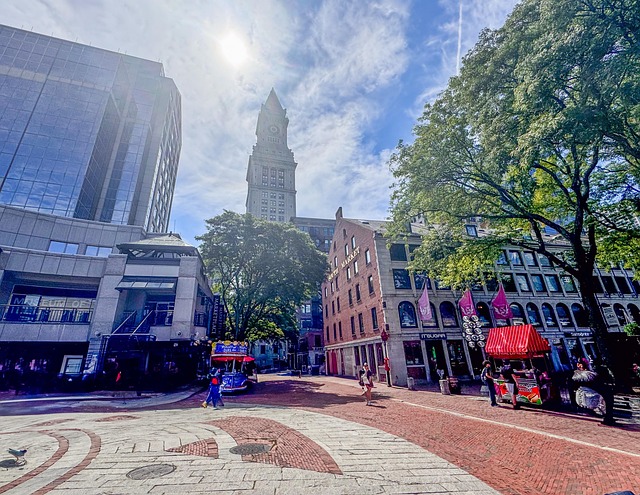Boston tackles outdated tech through enhanced computer recycling practices, driven by environmental awareness and corporate social responsibility. Local recycling centers offer secure data erasure, refurbishing, and responsible e-waste handling. Transparent processes build consumer trust, while events like e-scrap collection promote participation in a circular economy. Advanced technologies enhance material recovery, reducing e-waste impact on the environment.
“Boston, a city known for its innovation, is also making waves in sustainable technology practices with its computer recycling initiatives. This article explores the city’s recycling landscape and delves into the power of transparency within this sector. We discuss how open processes build consumer trust, ensuring data security through best practices, and highlighting local efforts driving responsible e-waste management. Furthermore, we anticipate future trends, offering a comprehensive guide to Boston’s computer recycling scene.”
- Understanding Boston's Computer Recycling Landscape
- The Benefits of Transparent Recycling Processes
- How Transparency Enhances Consumer Trust
- Best Practices for Secure Data Destruction
- Local Initiatives Promoting Responsible Recycling
- Future Trends in Computer Recycling Technology
Understanding Boston's Computer Recycling Landscape

Boston, a city known for its technological innovation, also faces a significant challenge when it comes to managing outdated computer hardware. The rapid pace of technology advancement results in a constant influx of new devices, making it crucial to have efficient computer recycling methods in place. Understanding the local landscape of computer recycling is essential to ensure sustainable disposal practices.
The city and its residents have shown a growing awareness of environmental issues, leading to an increase in demand for responsible computer recycling services. Boston computer hardware salvage has become a key focus area as businesses and individuals seek ways to dispose of their outdated electronics responsibly. Recycling centers for electronics in Boston play a vital role in this process, offering various programs to collect, refurbish, and recycle computers, servers, and other electronic equipment. Local IT asset recovery initiatives also contribute to the overall sustainability goal by providing secure data erasure and hardware destruction services, ensuring that sensitive information remains protected during the recycling process.
The Benefits of Transparent Recycling Processes

Computer recycling with transparency offers numerous advantages for both individuals and businesses in the Boston area. When recycling processes are open and clear, it builds trust among participants, ensuring that electronic waste (e-waste) is handled responsibly. This transparency also helps to maintain high standards of environmental protection by confirming that hazardous materials are properly managed and disposed of, following regulations set forth by local e-scrap facilities.
For businesses in the Boston area, it’s crucial to partner with reputable computer recycling centers that provide e-waste management services. By doing so, they can recycle old computers with ease while ensuring their data security and environmental impact. This approach not only contributes to a cleaner, more sustainable Boston area but also aligns with corporate social responsibility goals by promoting ethical e-waste disposal practices.
How Transparency Enhances Consumer Trust

Transparency plays a pivotal role in fostering consumer trust when it comes to computer recycling Boston services. By being open and honest about the entire process, from collection to disposal or repurposing, businesses can assure customers that their old electronics are handled responsibly. This means providing detailed information on how data is securely erased, what happens to components at each stage, and even where recycled materials end up. Such transparency builds confidence, knowing their contributions to eco-friendly electronic disposal are making a positive impact without compromising security.
For instance, highlighting successful tech recycling drives near me and sharing statistics about the tons of e-waste diverted from landfills can showcase the environmental benefits. This approach resonates with consumers who prioritize sustainability and want to make eco-conscious tech upgrades. Transparency creates a sense of partnership, encouraging more people to participate in these initiatives and collectively drive positive change through responsible computer recycling practices.
Best Practices for Secure Data Destruction

When engaging in computer recycling Boston services, ensuring secure data destruction is paramount to protect sensitive information. Best practices include using certified data erasure software that overwrites all data multiple times, a process known as degaussing for hard drives, and physically destroying or erasing solid-state drives (SSDs). Reputable recycled technology stores nearby often offer these services, allowing individuals and businesses to dispose of their electronic waste responsibly while maintaining privacy.
Additionally, participating in e-scrap collection events Boston and computer recycling events Massachusetts can contribute to effective e-waste reduction strategies. These initiatives not only help in the safe disposal of outdated or damaged electronics but also promote sustainable practices by repurposing and recyling valuable materials found in computers and other electronic devices. Engage with local e-waste recycling businesses for a comprehensive solution that ensures data security while making a positive impact on the environment.
Local Initiatives Promoting Responsible Recycling

In cities like Boston, local initiatives are leading the way in promoting responsible computer recycling practices. Organizations and community groups have been actively organizing e-scrap collection events throughout the Boston metro area to ensure proper disposal of electronic waste, or e-waste. These efforts aim to combat the growing problem of e-waste accumulation, which can have severe environmental impacts if not managed sustainably.
Through partnerships with local recycling centers, these initiatives facilitate the collection of outdated computers, monitors, keyboards, and other electronic devices. The collected e-scrap is then processed using state-of-the-art techniques to extract valuable materials while minimizing hazardous waste generation. Events like Boston computer recycling campaigns in 2023 not only help residents responsibly dispose of their old tech but also contribute to a circular economy by repurposing and recirculating resources, thereby reducing the demand for new raw materials and lessening the environmental footprint of both e-waste generation and traditional mining practices.
Future Trends in Computer Recycling Technology

The future of computer recycling in Boston and across Massachusetts (MA) looks promising with emerging technologies poised to revolutionize waste management. Innovative methods are being developed to enhance the efficiency and transparency of the recycling process, ensuring that old tech finds new life. One trend is the integration of advanced sorting systems, employing artificial intelligence and machine learning to identify and categorize computer components accurately. This not only speeds up the recycling process but also enables better recovery of valuable materials, reducing the environmental impact of e-waste.
Green tech recycling options are becoming more accessible, with numerous drop-off points scattered across Boston and MA offering convenient ways for individuals and businesses to dispose of their old computers responsibly. These centers often provide not just recycling services but also refurbished or recycled computers for sale, promoting a circular economy. Such practices not only help in computer waste management MA but also contribute to the local green tech ecosystem, fostering a sustainable future for both technology and the environment.
Computer recycling in Boston is evolving, with a growing emphasis on transparency throughout the process. By understanding local initiatives and adopting best practices for secure data destruction, businesses and residents can ensure responsible recycling. This approach not only protects sensitive information but also fosters consumer trust and supports sustainable technology management. Looking ahead, advancements in computer recycling technology promise an even more efficient and eco-friendly future for Boston’s digital waste.














